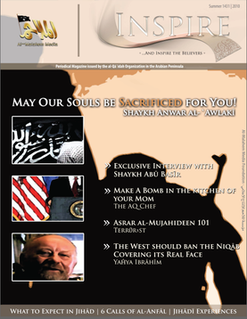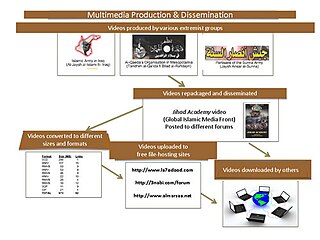This article possibly contains original research .(October 2020) (Learn how and when to remove this template message) |
A jihad satire is a political satire that satirizes the idea of violent jihad.[ citation needed ]
This article possibly contains original research .(October 2020) (Learn how and when to remove this template message) |
A jihad satire is a political satire that satirizes the idea of violent jihad.[ citation needed ]
The musical comedy Jihad! The Musical and the film Four Lions are works of art that satirise jihadis. [1] [2] [3] [4] The Australian describes Four Lions as "a satire on Islamic jihadism and its murderous ambitions." [5] The satirical Jihad! The Musical featured a hero who cheerfully sang, "I wanna be like Osama, I wanna bomb a path to fame across the Earth. People may abhor me but by God, they won't ignore me, When the CIA determines what I'm worth." [6]
Comedian Jeff Dunham's puppet character "Achmed the dead terrorist" is a popular example of jihad satire in the United States. [7] Achmed is a puppet who shouts, "Silence, I kill you!" whenever the audience laughs at something that offends his sensibilities. [8] Dunham explains that he portrays Achmed as incompetent so that when the audience realise that the character is "a bumbling idiot with problems in life", they appreciate that he is human. [8]
Mental health professionals argue that humor and satire can alleviate the mental health impact of terror attacks, helping to heal the survivors of terror attacks and rescue personnel suffering the consequences of exposure to the horrors of deliberate mass murder. [8] [9] [10] [11]
Arab-American comedian Ray Hanania has written, "If there were a bit of humor in the Middle East, I think that there might not be so much fanaticism. Humor can be a counter to the environment that breeds fanaticism and terrorism." [12]
According to Psychology Today , humor is the most powerful tool to prevent individuals from becoming Islamic suicide bombers; however, to be effective, the humor has to come from within the Muslim community and it has to be "aimed at the culture's sacred values." [13] According to psychologist Molly Castelloe Fong, "Humor has the potential to gradually, over time, alter what it means to be a heroic martyr in the mind of extremist groups." [13]
Agence France-Presse has reported that "Satire and ridicule can help win the fight against Al-Qaeda by stripping it of its glamour and mystique." [14] [15]
The Demos group, a think tank in the United Kingdom, is among the academic institutions that have suggested that satire can be an effective tool in undermining support for violent jihad. [1] According to some terrorism experts, successful recruitment for violent jihad depends upon convincing potential recruits that jihadis are "pious warriors of God". They postulate that by "highlighting their incompetence, their moral failings, and their embarrassing antics", it may be possible to "undermine" support for violent jihadi organizations including Al Qaeda and the Taliban. [16] Researchers for Demos recommend satire as a means of undermining the popularity of violent jihad, noting that "satire has long been recognised as a powerful tool to undermine the popularity of social movements: both the Ku Klux Klan and the British Fascist party in the 1930s were seriously harmed by sustained satire." [17]

Al-Qaeda is a transnational extremist Salafist militant organization founded in Peshawar, Pakistan in 1988 by Osama bin Laden, Ayman al-Zawahiri, Abdullah Azzam, and several other Arab volunteers during the Soviet–Afghan War.

Terrorism is, in the broadest sense, the use of intentional violence for political or religious purposes. It is used in this regard primarily to refer to violence during peacetime or in the context of war against non-combatants. The terms "terrorist" and "terrorism" originated during the French Revolution of the late 18th century but gained mainstream popularity in the 1970s during the conflicts of Northern Ireland, the Basque Country and Palestine. The increased use of suicide attacks from the 1980s onwards was typified by the September 11 attacks in New York City and Washington, D.C. in 2001.

Islamic terrorism, Islamist terrorism or radical Islamic terrorism are terrorist acts against civilians committed by violent Islamists who claim a religious motivation.

Jaish-e-Mohammed is a Pakistan-based Deobandi jihadist Islamic terrorist Mujahideen group active in Kashmir. The group's primary motive is to separate Kashmir from India and merge it into Pakistan. Since its inception in 2000, the group has carried out several attacks in the state of Jammu and Kashmir. It portrays Kashmir as a "gateway" to the entire India, whose Muslims are also deemed to be in need of liberation. After liberating Kashmir, it aims to carry its 'Jahad' to other parts of India, with an intent to drive Hindus and other non-Muslims from the Indian subcontinent. It has carried out several attacks primarily in the Indian state of Jammu and Kashmir. It also maintained close relations with Taliban and Al-Qaeda in Afghanistan and continues to be allied with these groups.

Per Magnus Ranstorp is a Swedish scholar who has written about Hezbollah, Hamas, Al-Qaeda and other militant Islamic movements. He is the Research Director of the Centre for Asymmetric Threat Studies at the Swedish National Defence College, directing a project on Strategic Terrorist Threats to Europe which focuses on radicalisation and recruitment of salafist-jihadist terrorists across Europe and the convergence between Chemical, Biological, Radioactive and Nuclear Weapons and Terrorism. Ranstorp graduated from Gustavus Adolphus College in Saint Peter, Minnesota in 1985.

Jihadism is a 21st-century neologism found in Western languages to describe Islamist movements perceived as military movements "rooted in political Islam" and "existentially threatening" to the West. It has been described as a "difficult term to define precisely", because it remains a recent neologism with no single, generally accepted meaning. The term "jihadism" first appeared in South Asian media; Western journalists adopted it in the aftermath of the September 11 attacks of 2001. It has since been applied to various insurgent and terrorist movements whose ideology is based on the Islamic notion of jihad.
Islamic extremism is any form of Islam that opposes "democracy, the rule of law, individual liberty and mutual respect and tolerance of different faiths and beliefs". Related terms include Islamist extremism, fundamentalism and radical Islam. It is not to be confused with Islamism, which is politicized Islam. Islamic terrorism or Jihadism is very often the result of Islamic extremism, although not in every case.
Evan F. Kohlmann is an American terrorism consultant who has worked for the FBI and other governmental organizations.

Malcolm Wrightson Nance is an American author and media commentator on terrorism, intelligence, insurgency, and torture. He is a former United States Navy senior chief petty officer specializing in naval cryptology.

Terrorism in the United Kingdom, according to the Home Office, poses a significant threat to the state. There have been various causes of terrorism in the UK. Before the 2000s, most attacks were linked to the Northern Ireland conflict. In the late 20th century there were also attacks by Middle Eastern terrorist groups, most of which were linked to the Arab–Israeli conflict.

Salafi jihadism or jihadist-Salafism is a transnational religious-political ideology based on a belief in "physical" jihadism and the Salafi movement of returning to what adherents believe to be true Sunni Islam.
Jarret Brachman is an American terrorism expert, the author of Global Jihadism: Theory and Practice and a consultant to several government agencies about terrorism.
A "jihobbyist" is a term coined by Jarret Brachman to characterise a person who is not an active member of a violent jihadist organization such as Al-Qaeda or the Somali Al Shabaab, but who has a fascination with and enthusiasm for jihad and radical Islam.

Inspire is an English language online magazine reported to be published by the organization al-Qaeda in the Arabian Peninsula (AQAP). The magazine is one of the many ways AQAP uses the Internet to reach its audience. Numerous international and domestic extremists motivated by radical interpretations of Islam have been influenced by the magazine and, in some cases, reportedly used its bomb-making instructions in their attempts to carry out attacks. The magazine is an important brand-building tool, not just of AQAP, but of all al-Qaeda branches, franchises and affiliates.
Jihadi tourism, also referred to as jihad tourism or jihadist tourism, is a term sometimes used to describe travel to foreign destinations with the object of scouting for terrorist training. US diplomatic cables made public by WikiLeaks in 2010 have raised concerns about this form of travel. Within intelligence circles, the term is also sometimes applied dismissively to travellers who are assumed to be seeking contact with extremist groups mainly out of curiosity.

Terrorism, in some of its definitions, serves to communicate a message from terrorists to a target audience (TA). By extension, symbols play an important role in such communication, through graphics that the organizations use to represent themselves, as well as the meaning and significance behind their choice of targets.
Jihadist extremism in the United States refers to Islamic extremism occurring within the United States. Islamic extremism is adherence to a fundamentalist interpretation of Islam, potentially including the promotion of violence to achieve political goals. In the aftermath of the September 11, 2001 terror attacks, Islamic extremism became a prioritized national security concern of the United States government and a focus by many subsidiary security and law enforcement entities. Initially, the focus of concern was on foreign terrorist groups, particularly al-Qaeda, but in the course of the years since 9/11 the focus has shifted more towards Islamic extremism within the United States. The number of American citizens or long-term residents involved in extremist activity is small, but nevertheless is a national security concern.

The Global Islamic Media Front (GIMF) is an Islamist propaganda organization that is associated with the terrorist group, al-Qaeda, and other jihadist groups. The GIMF is known by the U.S. Federal Bureau of Investigation (FBI) as an "underground media" organization. The GIMF specializes in production of jihadist material for distribution. It is one of several organizations that jihadists use to spread information via the Internet, including the well-known As-Sahab. Their slogan that is used on their materials is "Observing Mujahideen News and Inspiring the Believers." There is no indication who the leader of this organization is.
Steven Stalinsky is an expert on the Middle East, terrorism and terrorist use of the Internet, and encryption technologies, and has served as Executive Director of the Middle East Media Research Institute (MEMRI) since 1999. Since 2006, his research has focused on detailing and developing strategies against cyber jihad, describing how terrorist groups such as Al-Qaeda, ISIS, and others use the Internet, social media, and encryption for propaganda, recruiting, and hacking. He was an early advocate of calling on the tech community to take stronger action on removing terrorist content from their platforms and for creating industry standards to combat it.
Jihad Media Battalion is a terrorist organization active in Latin America. The group is among a number of Jihadi groups active in the Tri-Border Area (TBA) of Brazil, Paraguay and Argentina.